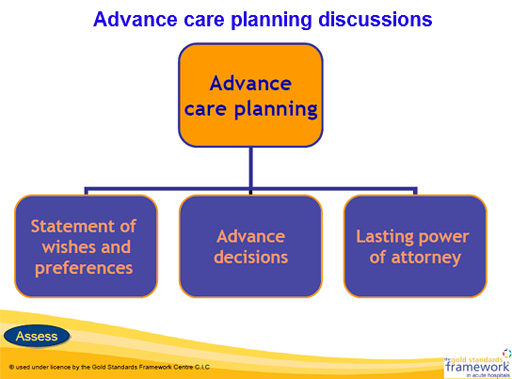3.3 What is advance care planning (ACP)?
The above diagram represents the topics covered during an ACP discussion.
This is an ongoing process of discussion between the person with Parkinson’s, those closest to them and their health and social care professionals, focusing on the person’s wishes and preferences for their care over the condition’s trajectory and as they approach the end of their life.
Advance care planning may include:
The individual’s concerns and wishes.
Their most important values or personal goals for care.
Their understanding of their illness and the prognosis.
Their psychological and spiritual requirements.
Their preferences and wishes for types of care and place of care if they are not able to look after themselves.
Expressed views on organ or tissue donation.
Their preferences regarding the type of treatment that may be beneficial in the future and the availability of these treatments.
You can find more detail in Advanced Care Planning: A Guide for Health and Social Care Staff [Tip: hold Ctrl and click a link to open it in a new tab. (Hide tip)] .
NHS Scotland has also produced an Anticipatory Care Planning Toolkit.
Documentation of ACP
It is important that you are sensitive to the person’s feelings and desires to have this conversation and so should avoid following a prescriptive method of interviewing and recording these discussions.
There is no set format for making a record of ACP discussions, but some health trusts and charities may be able to provide an informal document for the individual to use.
For example Gold Standards Framework provides guidance information and direction on ACP and this includes a document that allows the person to record their preferences and priorities for their future care.
The ACP is not a legally binding document, but must be taken into account when acting in the person’s best interests.
It must be reviewed and updated as the individual’s situation or views change. In accordance with the client’s wishes a copy of the ACP may be held in the client’s healthcare/electronic notes. The GP and family may be aware of the contents and where it is stored.
The timing and context of ACP
ACP may be initiated by either the health and social care professional or the individual, and may be prompted by one of the following life events:
- Death of a spouse, close friend or relative.
- Following diagnosis with Parkinson’s.
- Significant shift in treatment focus, eg treatment less effective or fewer options.
- Multiple hospital admissions.
The health and social care professional initiating this conversation should have full knowledge of the individual’s medical condition, treatment options and social situation.
Reflective exercise
So far in section 3 we have discussed the challenges of predicting the end of life and discussed advance care planning. Consider this information as you read through this case study about Suzi, a young mother with Parkinson’s, and consider how you would commence a conversation about ACP.
You can record your thoughts in your reflection log.
Case study
Suzi was diagnosed with Parkinson’s four years ago. She is married and has two children. She has been working full time as a hairdresser, and manages her home and young children, aged 6 and 4. Recently, her condition has deteriorated. She has developed anxiety and any stressful situation increases her anxiety and exacerbates her tremor. Her clients have commented on Suzi’s hand tremor and this increases her anxiety.
She has lost strength and volume in her voice and finds it difficult to communicate at work. She suffers increased fatigue after her day at work and feels this affects her relationship with her children, as she is too tired to interact and play with them. Due to these changes, Suzi has become quite self-conscious and no longer wants to socialise as much, especially with strangers.
Reflection 1
Reflect on the case study and note the issues that Suzi is experiencing and decide how you would assist her to overcome these issues.
Use the reflection log to record your thoughts
Discussion
In your reflection you may have considered the following:
Referring Suzi to the appropriate allied health professionals to assist her to manage her increasing symptoms, such as:
- Speech and language therapist for speech management.
- Occupational therapist to assist with work related issues and fatigue.
- Community psychiatric nurse, psychologist or occupational therapist to teach her coping strategies for her anxiety.
- Neurologist to reassess her medication.
It will also be necessary to involve her husband and discuss his involvement in childcare to ease Suzi’s stress.
Reflection 2
Reflect on what you have just read about commencing discussions on ACP, then write a paragraph with an argument for or against commencing an ACP discussion with Suzi and her husband at this stage.
Use the reflection log to record your thoughts
Discussion
In your reflection you may have considered the following:
It would be an appropriate time to encourage this couple to think about how Parkinson’s is progressive, and that Suzi’s ability will slowly deteriorate, encouraging them to discuss their changing roles in the future. The advance care planning (ACP) discussion could centre around the idea of involving the extended family in Suzi’s care in the future, if this is what they would wish. Encourage them to discuss making a Will for the safekeeping of their children. When discussing the Will encourage them to think about power of attorney. An ACP discussion at this stage will promote realistic expectations for Suzi’s future.
ACP promotes person-centred care throughout the condition’s trajectory.
Research and client experience has shown these discussions can never take place early enough, and they will improve client care outcomes.
Some of you may argue that Suzi is too young for discussions about ACP, and that discussing the progressive nature and increasing disability of Parkinson’s at this early stage may cause Suzi and her husband more distress and anxiety. She is in the early stages of her condition and with medication, exercise and support she will continue to manage. Discussing ACP may cause her to lose hope and maybe experience depression, and be psychologically less able to manage.
The discussion around advance care planning may lead to the individual recognising, if they were no longer physically or mentally able to make decisions about their finances or property, that they may need to consider appointing an attorney.
3.2 How do we manage the challenges of predicting end of life care in Parkinson’s?

